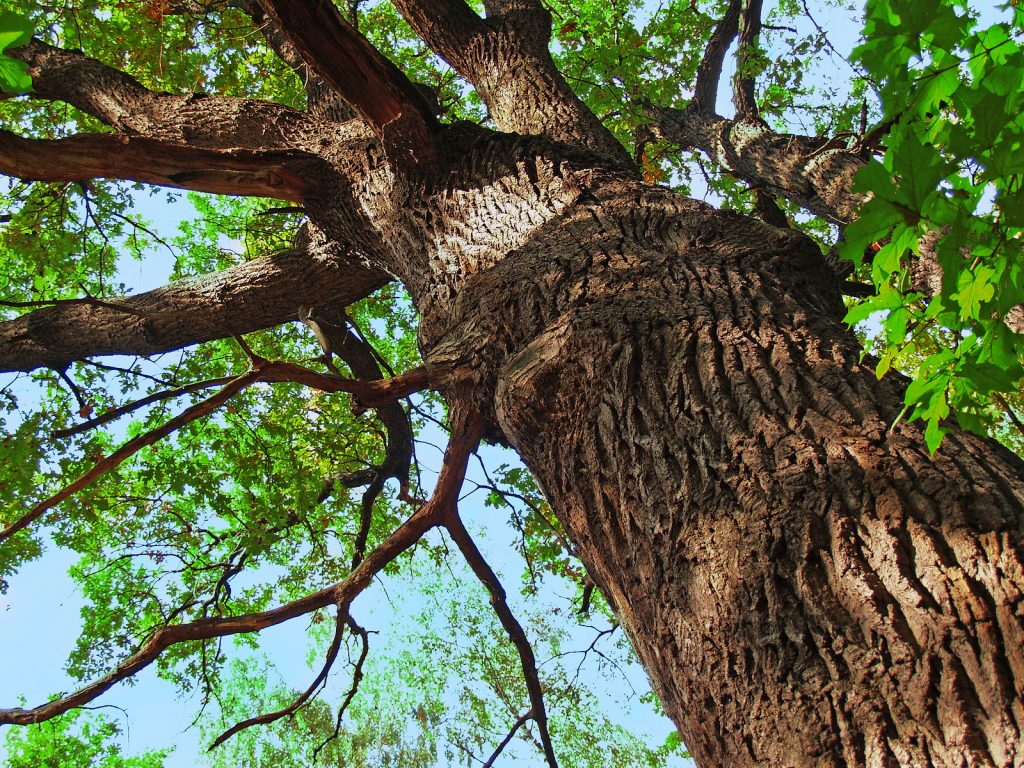People love oak trees. They’re majestically broad and protective feeling, with dense green foliage spans.
About Oaks
Oaks grow naturally across the Southeastern USA. They can be found on the east shore from southeastern Virginia to Florida and west to southern and central Texas. They grow naturally in the sandy soils of low coastal areas.
Oaks have male and female reproductive systems on the same plant. They flower every spring from March through May and acorns mature in September and fall off by December. Live oak acorns are long, dark brown to black.
They seldom grow over 50 feet tall, but the crown of the tree can have a span of 150 feet wide. That’s why it’s an incredibly popular shade tree! Oak tree wood is so sturdy that they were used for shipbuilding years ago, but today they’re mostly decorative trees.
Oak Wilt and Fungal Infections
Oaks tend to grow in huge groups with interconnected roots, which makes them extremely vulnerable to contracting oak wilt. The fungus travels from one oak to another through the linked roots and insect activity. Oak wilt destroys hundreds of trees just in Austin, Texas every year because of how rapidly they expand in groves.
Symptoms of oak wilt are otherwise healthy leaves developing yellow veins, turning brown and falling off the tree outside of autumn. The crown of the tree thins and weakens till it dies. Oak wilt can be costly to treat and regulate. An accurate medical diagnosis is critical. You’ll need to consult a certified arborist to guarantee proper medical diagnosis and treatment.
Unfortunately, oak wilt is quite infectious. Without the proper treatment, the death of the tree is inevitable.
Arborjet Therapy to the Rescue
Avoidance starts with expertise. To treat this fungus effectively, you need to seek the services of an expert.
Once diagnosed, we advise a trunk shot of the Arborjet Treatment, Propizol. It contains a systemic fungicide that reduces Bretiziella fagacearum, and specifically to combats oak wilt. Because oak wilt is spread through roots and insects, we advise Arborjet therapy of non-infected oaks near the contaminated trees. This can slow down and stop the spread of the condition.
After Care
Infected trees are highly susceptible to nitidulid beetles, which also carry oak wilt fungus. You’ll want to schedule tree trimmings at appropriate times to avoid nitidulid beetles, planning your trimming around the beetles’ off period. The active period for nitidulid beetles varies throughout the USA, so consult with your arborist.
A wound dressing that’s not toxic to plants is important on injured oaks, including those those that have been trimmed. Painting the wounds of an oak after cutting it will shut the wound off to prospective infection from nitidulid beetles. The county may penalize you for not repainting the wounds of a tree that’s just been trimmed.
When treating several trees, your arborist must sanitize drill bits and also injection devices between trees. Sexy Trees is an expert in controlling the spread of infection, with industry leading sterilization and sanitation. Don’t assume every arborist is as careful as is necessary when dealing with oak wilt and beetle infestations. Always ask.
Get in touch with Sexy Trees if you believe a stump or a tree on your property may be influenced by oak wilt.
 Bringing Sexy Back Into Your Yards
Bringing Sexy Back Into Your Yards 
